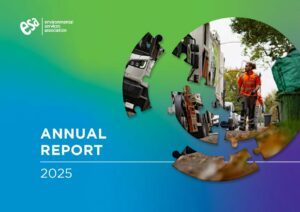By Jacob Hayler, Executive Director of the ESA
The ESA is shortly due to publish its “Vision 2040” position paper setting out an ambitious but pragmatic pathway for the future of the UK’s circular economy. By 2040 we want to have doubled resource-productivity from the national baseline and eliminate all avoidable waste, which will be achieved through a range of interdependent interventions across the spectrum of policy, research and development; service delivery and infrastructure investment.
We believe that our circular economy aspirations will be achieved through five broad themes: Reducing waste arisings; maximising the recyclability of waste that cannot be avoided; increasing participation across the value chain; improving recycling and waste treatment processes to maximise material capture; and preventing waste from leaving the closed loop by minimising “leakage”.
This will require fundamental changes to societal consumption patterns alongside significantly increasing the prevalence of re-use and repair for products and packaging before they are discarded. Designing-out waste by considering the real-world lifecycle impacts of products and packaging will also play a key role in reducing waste arisings, and this includes considerations around appropriate material usage – ensuring materials are used appropriately and efficiently within the circular economy system.
We believe that all materials placed on the market should have a circular economy solution, which the ESA defines as meeting a clear end-of-waste specification as a secondary commodity, construction material or low-carbon fuel with a viable end market. Achieving this will necessitate a design focus on the post-consumer journey of materials and may require measures such as switching materials or formats, or greater use of mono-material constructions, particularly for packaging. It will also be essential that markets, and corresponding demand, for secondary materials are incentivised and developed in order to close the loop.
For the circular economy system to function in synchronisation, it will require the participation of all across the value chain, which will necessitate consistent and comprehensive recycling services across the UK alongside communications campaigns to engage consumers and businesses to use them – not just as a one-off but in perpetuity.
Limiting residues arising from the post-consumer journey of waste material will also play an important role in reducing avoidable waste to zero. To do this, the recycling and waste management industry will need to focus on measures to reduce process losses; minimise sorting inefficiencies; create and deliver standardised outputs from waste materials and deploy technological innovations – such as AI and robotics – to support these goals. Energy-from-waste equipped with carbon capture will continue to play a vital role in maximising the circular economic value of the remaining residues as we virtually eliminate landfill.
Once all of this is in place, we must prevent waste material from leaking out of the loop once it has been closed. This means eradicating waste crime and ensuring that any and all post-consumer material destined for export has already undergone domestic processing to achieve an end-of-waste specification.
Our members have an enviable track record of delivering significant infrastructure and essential services across the United Kingdom, and the billions they have invested in the UK has played a central role in moving millions of tonnes of waste material up the waste hierarchy over the past 25 years. We stand poised to invest a further £15billion in the UK’s circular economy to achieve our Vision 2040 – creating 40,000 new jobs across Britain in activities such as re-use, repair and material reprocessing, but this will require investable conditions achieved through a strong policy and regulatory landscape.
We look forward to further working with Government; other stakeholders and the Circular Economy Task Force to develop a roadmap for the waste sector specifically in 2026, and we view our Vision 2040 position paper as offering a head-start on this process.
The Vision 2040 position paper will be launched at a drinks reception at the National Portrait Gallery from 18.45 on Wednesday 4th July. This event is free to attend and all of our members and valued stakeholders are invited to join us.
This will be preceded by our Annual Conference, which takes place earlier in the day at The Royal Horseguards, Whitehall. This conference will provide an excellent opportunity to hear from peers across the industry as well as policy-makers, to discuss some of the shorter-term issues affecting the sector around the Collection and Packaging Reforms implementation; the Emissions Trading Scheme and waste crime.
The event is free to attend for ESA members and more information can be found here
We look forward to seeing you there.




